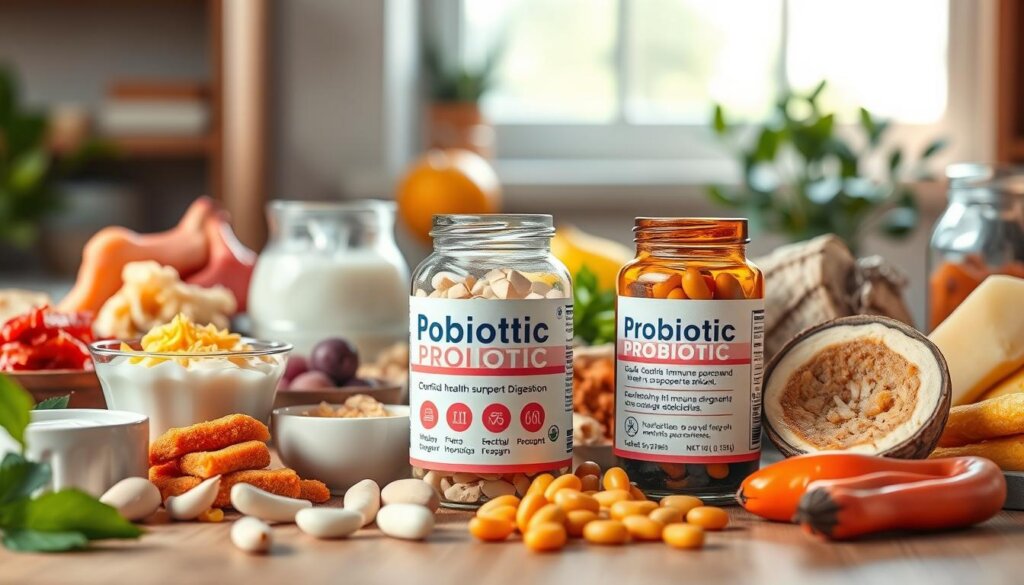What if the secret to better health isn’t found in a pill, but on your plate? Emerging research shows that trillions of microbes in your digestive system hold surprising power over your physical and mental well-being. These tiny allies—probiotics—are living organisms that work tirelessly to balance your gut, strengthen immunity, and even influence mood.
Scientists now link a thriving gut microbiome to benefits like smoother digestion, clearer skin, and reduced inflammation. But here’s the twist: many people rely on supplements while overlooking everyday foods packed with diverse strains of these helpful bacteria. Fermented favorites like yogurt, kimchi, and tempeh deliver probiotics alongside vitamins and enzymes that supplements can’t match.
Why does this matter for Malaysians? Local diets rich in pickled vegetables, tapai, and probiotic drinks offer accessible options. Pairing these with fiber-filled foods creates an ideal environment for good bacteria to flourish. The result? A stronger gut lining, better nutrient absorption, and protection against harmful pathogens.
Key Takeaways
- Probiotics support digestion, immunity, and mental health through gut balance.
- Food sources often provide more varied strains than supplements.
- Fermented items like yogurt and kimchi are probiotic powerhouses.
- Combining probiotics with fiber maximizes their benefits.
- Gut health impacts skin clarity and inflammation levels.
- Local Malaysian foods can be excellent probiotic choices.
Introduction to Probiotics and Gut Health
Your body hosts an invisible ecosystem of microscopic allies. These probiotic bacteria are live microorganisms that thrive in your digestive system, acting as frontline defenders for digestion, immunity, and even mental clarity.
Understanding Probiotic Basics
Not all bacteria are harmful. Strains like Lactobacillus acidophilus and Bifidobacterium longum crowd out dangerous pathogens while breaking down food. Research from the Cleveland Clinic shows they also produce vitamins and regulate metabolism.
Different strains serve unique roles. For example, L. rhamnosus supports immune responses, while B. breve aids nutrient absorption. This diversity explains why fermented foods with multiple cultures often outperform single-strain supplements.
Why Gut Health Matters
A balanced gut microbiome prevents harmful bacteria from dominating. Studies link imbalances to chronic conditions like type 2 diabetes and certain cancers. Maintaining this balance strengthens your body’s defenses—health benefits of probiotics include reduced inflammation and improved infection resistance.
Your gut also communicates with your brain via the gut-brain axis. This connection influences mood and cognitive function, proving that a healthy gut supports both physical and mental health.
What Are Probiotics and Their Health Benefits
Your gut is home to a thriving community of microscopic helpers that do more than just process food. These friendly bacteria—particularly strains like Lactobacillus and Bifidobacterium—act as tiny guardians, working to optimize your body’s functions. Their influence stretches far beyond digestion, impacting everything from immune defenses to mental clarity.

Key Functions of Probiotic Bacteria
These microorganisms perform critical tasks. They break down food, produce vitamins like B12 and K2, and crowd out harmful pathogens. For example, yogurt’s live cultures help strengthen bones while lowering risks linked to diabetes and certain cancers. Kefir’s diverse strains enhance nutrient absorption and shield against infections.
Impact on Digestion, Immunity, and Beyond
Probiotic-rich foods create ripple effects throughout the body. Studies show fermented items like miso can regulate cholesterol and blood pressure. They also support weight management by improving metabolic efficiency. Even mental wellness gets a boost—research suggests gut bacteria communicate with the brain, potentially easing anxiety symptoms.
For those curious about specific bacterial strains, options like kimchi and tempeh offer varied cultures. Pairing these with fiber-rich foods amplifies their health benefits, creating a gut environment where good microbes thrive.
Exploring Natural Ways to Get Probiotics
The journey to a healthier gut might begin in your fridge, not the supplement aisle. While capsules offer convenience, traditional probiotic foods deliver living microbes alongside enzymes and nutrients that enhance their effectiveness.
Benefits of Fermented Foods
Through the fermentation process, ordinary ingredients transform into nutrient-dense powerhouses. Yogurt shines as a calcium-rich option teeming with Lactobacillus strains that combat digestive discomfort. Kefir, a tangy fermented drink, hosts up to 30 microbial varieties—three times more than most yogurts.
Comparing Fermented Foods and Supplements
While supplements provide specific strains, foods like kimchi and sauerkraut (fermented cabbage) offer complex microbial communities. These whole-food sources also supply prebiotic fibers that feed good bacteria. Studies suggest nutrients in fermented items improve probiotic survival rates by 37% compared to isolated supplements.
Examples from Yogurt to Kombucha
Beyond dairy options, explore bubbly kombucha or tempeh. Plain yogurt remains the most accessible choice—look for “live active cultures” on labels. For those avoiding dairy, water-based kefir or fermented vegetable blends provide similar benefits without lactose.
Incorporating Probiotic-Rich Foods into Your Diet
Revamping your meals with gut-friendly choices doesn’t require drastic changes—just smart swaps. Small additions of fermented foods can transform ordinary dishes into nutrient-packed powerhouses while supporting digestion.
Top Choices for Daily Meals
These five staples deliver diverse microbial benefits:
| Food | Key Nutrients | Probiotic Strains | Serving Ideas |
|---|---|---|---|
| Sauerkraut | Vitamins C, K, iron | Lactic acid bacteria | Salad topping, sandwich layer |
| Kimchi | Fiber, antioxidants | Lactobacillus kimchii | Rice bowls, omelet filling |
| Miso | Protein, zinc | Aspergillus oryzae | Soup base, glaze |
| Tempeh | Vitamin B12, protein | Rhizopus oligosporus | Stir-fries, wraps |
Building Tolerance Gradually
Start with 1-2 tablespoons of fermented vegetables daily. Pair kimchi with steamed rice or add sauerkraut to sandwiches. For dairy options, blend kefir into smoothies or mix cultured milk into oatmeal.
Those new to probiotic-rich diets might experience temporary bloating. Ease discomfort by drinking water and increasing portions weekly. Remember: prebiotic capsules work best when combined with food sources.
Miso’s versatility shines in salad dressings and marinades. Tempeh makes a satisfying meat substitute—pan-fry slices with turmeric for extra anti-inflammatory benefits.
Expert Insights on Choosing Probiotic Options
Navigating supermarket aisles for gut-friendly foods can feel overwhelming. Smart choices start with understanding labels and recognizing truly beneficial options. Let’s simplify the process with actionable tips from nutrition experts.
Nutritional Value of Popular Probiotic Foods
Not all fermented items offer equal benefits. The table below compares key options:
| Food Item | Key Nutrients | Active Cultures | Buying Tip |
|---|---|---|---|
| Yogurt | Calcium, Vitamin B12 | L. acidophilus, Bifidobacterium | Avoid brands with >10g sugar/serving |
| Sauerkraut | Vitamin C, Iron | Lactic acid bacteria | Choose refrigerated, unpasteurized |
| Kimchi | Fiber, Vitamin K | L. kimchii | Check for “naturally fermented” labels |
| Kefir | Magnesium, Protein | 30+ microbial strains | Opt for unsweetened varieties |
Guidance on Reading Labels for Live Cultures
Terms like “live cultures” or “active cultures” signal genuine probiotic content. Pasteurization destroys beneficial bacteria—always pick unpasteurized sauerkraut or kimchi. Watch for hidden sugars: flavored yogurts often contain 15g+ sugar per serving, undermining their health benefits.
True fermented foods use salt and lactic acid bacteria, not vinegar. Pickles preserved with vinegar lack live strains. For optimal nutrition, pair these foods with types of probiotics that match your digestive needs.
Experts recommend starting with small portions to build tolerance. Combine probiotic-rich items with fiber sources like oats or bananas to feed gut bacteria. This approach maximizes the benefits of your dietary choices.
Connect with Wellness Group for Probiotic Guidance
Personalized nutrition guidance could be your missing ingredient for gut health success. Wellness Group’s team helps Malaysians navigate probiotic-rich diets through science-backed strategies tailored to local lifestyles.

Your Direct Line to Nutrition Experts
Get answers in minutes via WhatsApp (+60123822655). Their specialists address questions about:
- Pairing traditional foods like tapai with modern meals
- Adjusting portion sizes for digestive comfort
- Identifying hidden probiotic sources in Malaysian markets
Flexible Support for Busy Schedules
Consultations adapt to your routine with these hours:
| Days | Hours |
|---|---|
| Weekdays | 9:30 AM – 6:30 PM |
| Saturday | 10:00 AM – 5:00 PM |
Clients receive customized meal plans combining local favorites like fermented durian with global superfoods. One recent participant reported:
“They helped me enjoy tempeh without bloating – life-changing for nasi lemak Fridays!”
Ongoing support ensures smooth transitions to probiotic-rich eating. Whether optimizing health goals or managing dietary restrictions, their experts bridge cultural preferences with cutting-edge nutrition science.
Conclusion
Your gut’s microscopic allies work best when fueled by smart dietary choices. Including probiotic-rich foods like yogurt, kimchi, and kefir creates a thriving environment for beneficial bacteria to flourish. These fermented items deliver diverse microbial strains alongside vitamins and enzymes that capsules often lack.
Start by adding one fermented item daily—try sauerkraut on sandwiches or miso in soups. Always check labels for “live cultures” and avoid products with added sugar. Unlike isolated supplements, whole-food sources support digestion while feeding existing gut microbes through natural fibers.
Consistency matters more than quantity. Rotate options like tangy kombucha or creamy tempeh to maintain microbial diversity. For personalized strategies, Wellness Group’s experts help blend local favorites with science-backed health practices.
Remember: A balanced gut system strengthens immunity and enhances nutrient absorption over time. Small, daily choices with fermented foods build lasting wellness from the inside out.
FAQ
What are the best probiotic-rich foods to add to a daily diet?
Fermented foods like yogurt (e.g., Activia or Siggi’s), kimchi, sauerkraut, kefir, and miso are excellent choices. These contain live cultures such as Lactobacillus and Bifidobacterium, which support digestion and immunity. Kombucha and tempeh also offer diverse strains of beneficial bacteria.
Can fermented foods replace probiotic supplements?
While fermented foods provide vitamins, fiber, and natural bacteria, supplements offer higher concentrations of specific strains. For mild gut issues, foods like Greek yogurt or fermented cabbage may suffice. For targeted needs, like antibiotic recovery, supplements like Culturelle or Renew Life might be more effective.
How can someone new to fermented foods avoid digestive discomfort?
Start with small portions, such as a spoonful of sauerkraut or a half-cup of kefir daily. Pairing them with meals—like adding miso to soup or yogurt to smoothies—helps the gut adjust. Gradually increase intake over weeks to allow the microbiome to adapt.
What should consumers look for when buying probiotic products?
Check labels for phrases like “contains live active cultures” or specific strains like L. acidophilus. Avoid products with added sugars or pasteurization, which can kill bacteria. Brands like Nancy’s Yogurt or Farmhouse Culture clearly label their live cultures and fermentation processes.
How does Wellness Group assist with personalized probiotic plans?
Wellness Group offers free consultations via WhatsApp at +60123822655 (Monday–Saturday, 9 AM–6 PM). Their experts analyze dietary habits, recommend foods like raw apple cider vinegar or natto, and suggest supplements if needed, ensuring a balanced approach to gut health.






